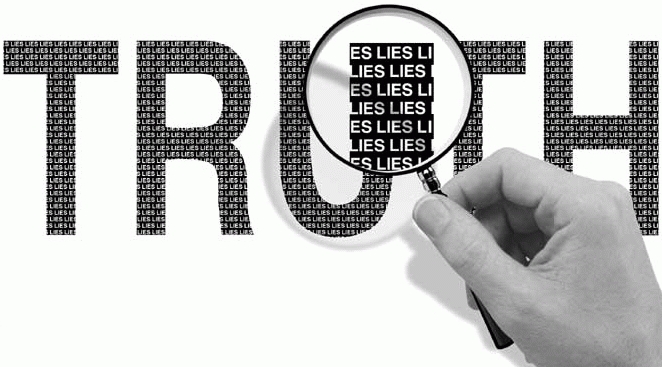Summary of JTM National Teleconference Sept. 25 on “Facts, Fibs, and Accountability in Political Reporting”
One key to solving the politics/political reporting dilemma of facts and fact-checking may be to engage people as more than voters.
“When politics and political leaders treat the public like consumers more than voters and politics as a product, then the public is disengaged,” said Marla Crockett, chair of the National Coalition for Dialog and Deliberation, “We need to engage them more in the process.”
On Tuesday, September 25th, about 40 intrepid people came together for an experiment in conversing on a topic of civic importance:
What will it take to increase the rewards for telling the truth in politics?
Here’s the audio.
(1 hour, 8 minutes 63 MB)
The participant mix was about 25% educators, with the other 75% divided relatively evenly among traditional media people, new media people, civic activists and media reformers, community members, students and others.
Using Maestro Conference, a technology for social conferencing, Journalism That Matters brought together voices of politicians, the public, and the press to consider a better way. Journalism That Matters has convened face-to-face conversations on the new news ecology for more than 10 years and hosted two start-up weekend events for media entrepreneurs of color.
The ideas ranged from the simple to the systemic:
- Collaborate among news outlets to check the facts. If different organizations take on different elements, the bandwidth for covering a broader range of issues increases.
- Focus on trends in accuracy. In addition to following the economics of campaigns, follow the veracity of their discourse. Move from episodic reporting of the facts in a speech to the tenor of the campaign.
- Use crowd-sourcing for fact-checking through platforms like Twitter. It engages the public directly in making sense of political discourse.
- Cite sources in stories. It demonstrates integrity and helps with verification.
- Increase training in news/media/civic literacy, particularly in schools. Are we asking the wrong question? In a world where we’ve got a stark divide, looking for the facts is too small. We need to provide the public with the skills for discerning the quality of their sources.
- Engage in dialogue. In an environment of entrenched cultural narratives, use skilled civic engagement practices to bring together people with differing views in conversations that move deeper than the usual rhetoric.
In the spirit of Journalism That Matter’s face-to-face convenings, the focus on the call was to look towards possibilities. JTM chooses this strategy – focusing on what is working – because a wealth of research demonstrates that human systems thrive when people have an image of a desirable future. Such images inspire people to move towards what they wish to create[1].
Michelle Ferrier, associate professor of communications at Elon University and a Journalism That Matters board member, moderated the call. She framed the solution as one that gives responsibility to politicians, journalists and the public.
“Accurate reporting isn’t just what we do during the election cycle, but what journalists must do everyday,” she said. “While we’ve heard more conversation lately, we have to look at the infrastructure to build something that works consistently.”
She introduced the four conversation catalysts who talked about the issue from their different perspectives:
- Justin Peters, managing editor/web and and a political writer at the Columbia Journalism Review
- Les Ihara Jr. Hawaii State Senator, who has served as Senate Majority Policy Leader since 2006
- Marla Crockett, chair of the National Coalition for Dialog and Deliberation and former news anchor, producer and news manager at public radio KERA in Dallas.
- Dan Conover, newspaper political reporter.
Justin Peters opened, saying that legacy print and broadcast media don’t see fact-checking as part of basic news reporting. He said it’s kept off to the side, as a second thought after the main story. That means fact-checking doesn’t happen “on cycle”, which diminishes its impact. The solution: Rethink newsroom priorities, because fact-checking is becoming instantaneous by citizens on social-media platforms.
Senator Ihara spoke of his choice to pursue a politics of integrity, recognizing that it means being willing to lose. He said, “I don’t believe the ends justify the means. This is the core value of the prevailing political culture. When the public values integrity, the political climate will shift.”
Dan Conover built on that theme from the perspective of political reporting, saying that the ultimate answer must go well beyond fact-checking to declaring a perspective, a claim to authority. When a journalist speaks to what s/he wishes to accomplish, it moves the focus from catching people in lies to setting a context for a productive system of exchange among politicians, the public, and the press.
Marla Crockett closed by offering a view of the public’s role in our political system. Beyond voting, Crockett said, “The public is the greatest underdeveloped resource that we have in our political system.” Rather than treating voters as consumers of a political product, it’s time to focus on engaging the public in the political process.
Following these remarks, our technical host, Amy Lenzo, split the group in to discussion groups of four people to discuss the question:
Imagine political reporting at its best. As rare as they’ve been, what are some examples you’ve seen? What could it look like?
When people returned to the plenary call, 20 minutes later, they named the ideas notes above for changing the situation. With some new ideas in hand, the call wrapped up in 1 and a half hours.
[1] Cooperrider, D. L. (2000). Positive Image, Positive Action: The Affirmative Basis of Organizing. Appreciative Inquiry: Rethinking Human Organization Toward a Positive Theory of Change, 29–53.

What a fabulous conversation we had with students, educators, politicians, journalists, community leaders, activists and new media representatives! What a difference a solutions-oriented perspective can make!